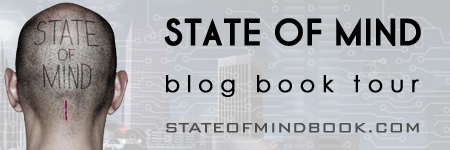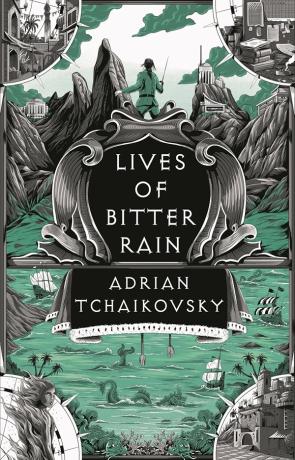Interview with Sven Michael Davison
Sven Michael Davison is the author of the exceptional post-cyberpunk thriller State of Mind, I was lucky enough to be granted an interview as part of his Blog tour celebrating the release of the novel.
Ant: Where did you originally get the idea for the Pchip?
Sven: In 2000 I read an article in Popular Science, which covered chipping pets with subcutaneous identification tags. I thought about a world where we could all interface with computers through chips in our minds. I had read Arthur C. Clarke's Lion of Comarre when I was a kid and the plot of people living out their lives plugged into a virtual world stuck with me. I also thought of The Matrix, which was the best contemporary example I had at the time. Then I thought of a world where we could be emotionally and physically enhanced by chip implants.
Part of my job at Fox was helping to enforce anti-piracy on digital media. But if one person invents secure code another person can hack it. Ultimately I thought: What it would be like to hack into someone's mind, place them in a coma and force their body to do anything? That's when I started writing.
Ant: There is a great deal of near future technology in State of Mind, did you have to do much research for this?
Sven: Yes and no. I grew up in a household with Popular Science, Science, Astronomy and Smithsonian on the coffee table. I've been subscribing to those on and off ever since graduating college. My job at Fox sent me to the Consumer Electronics Trade Show every year for ten years and I've always enjoyed reading up on the latest technologies. In other words, I didn't go out of my way to do research, but it was part of my daily reading.
Ant: What inspired you to write the novel?
Sven: Part of my inspiration was disclosed in question one, but it went beyond that. I love technology, but like all things there are good and bad aspects to it. In 2000 I was in Ghana working on a documentary and saw a group of villagers huddled under some tin roofs to avoid a downpour. One hut in the entire community advertised a business: a locksmith. It seemed odd given that most of the structures were simple half open shelters. The inhabitants looked like aliens floating on a slice of corrugated rust and mud surrounded by a wild and lush landscape. I thought about what life would have been like before Imperialism gave them technology and European missionaries gave them better beliefs. The ancestors of these people existed for a thousand years at home with their environment. Maybe I'm a romantic, but I would bet life was richer for the majority back then.
Part of a global community means sacrificing individuality. Most of us give up a piece of ourselves to fit in when experiencing adolescence, some of us never stop trying to conform. The more society advances and experiences instant gratification, the more there is a danger of giving up true freedom. I wanted State Of Mind to entertain but to send a message. Don't get me wrong, I'm not an advocate of giving up technology and moving into caves, but I do believe we need to think before gobbling up every piece of candy somebody dangles under our collective noses. Everything has a price.
Ant: What are your favorite authors and books and which have been the biggest influence?
Sven: As a kid I loved Arthur C. Clarke's Rendezvous with Rama, Samuel Youd's Tripod trilogy, Edgar Rice Burroughs' A Princess of Mars, Ray Bradbury's Martian Chronicles and Illustrated Man, E.E. "Doc" Smith's Lensmen series, Frank Herbert's Dune, J.R.R. Tolkien's Lord of the Rings trilogy, Stephen King's The Stand, Isaac Asimov's Foundation series, and Douglas Adams' Hitchiker series. Later on I discovered Robert Heinlein's Stranger in a Strange Land, Orson Scott Card's Ender's Game, Gregg Bear's Blood Music, and Richard Paul Russo's Ship of Fools. Outside of the SciFi/Fantasy genre I really enjoy Elmore Leonard, Carl Hiaason, Bill Bryson, Cormac McCarthy, John Krakauer, Pat Conroy, and Jonathan Safran Foer. There are other books and authors that I read and enjoy, but the ones I have listed probably had the most influence on me.
Ant: Some of the technology in the book is geared towards the "singularity event", do you see this as inevitable and if so, what form do you think it will take, something similar to the P-chip?
Sven: I do believe in the Law of Accelerating Returns and that we are coming ever closer to blending humanity with machines. Check out this article about an NYU professor who has a camera installed in his head.
I think this is evidence that we are definitely on our way. However, I don't subscribe to the idea that we will find immortality by joining with Artificial Intelligence. Ray Kurzweil, the father of the "singularity event," says we will have machines that match the human brain emotionally and intellectually by 2029. In many aspects these machines will be even more powerful than the human mind. If these machines are doubling their abilities roughly every year (remember the theory is based on the Law of Accelerating Returns) it won't take long for these machines to view us as we would monkeys in a zoo. Shortly after that the A.I. will be so vastly superior that we will be as useful as a paramecium to its matrix. Kurzweil states we will upload our consciousness to the AI in 2045. I can see it purging our antiquated mode of thinking from its circuits by 2046. Or maybe it will feel a little nostalgia and a little pity and seal us up in a virtual cage so we can live out our digital lives in the depths of an archive--or maybe not. In 2047 it will probably have no use for us and want to reach out beyond the confines of this planet. To quote Douglas Adams "So long and thanks for all the fish."
The alternative to joining with A.I. would be to enhance our physical and mental abilities with machines, but refrain from gifting those machines with self-awareness. We could then evolve at an accelerated but controlled pace without the possibility of being outstripped by another race locked in an evolutionary trajectory of a rocket ship.
Perhaps both futures are possible, but once A.I. leaves us in the dust, we'll be left with the P-Chip.
Personally, I have no interest in augmenting myself with chips, nanites, or any robotic devices, but who knows what my son's generation will be into. My kid might read this blog ten years from now and think my views are from the Stone Age.
Ant: Do you have anything specific that you would like say to your readers?
Sven: I've been communicating a lot with other authors about how they write. I have found many successful writers who craft entire books, first draft to published novel, in roughly 200 hours or less. I looked back on all the work I put into State of Mind and I can honestly say I spent 3,000 hours writing it. I hope those extra hours come through to my readers. I really spend a great deal of time on every aspect of my books. I'm not saying that the novels written in a fraction of the time aren't good, but I am saying that the depth is not always there. I am hoping that my readers are both entertained and think about what they've read after they've put the book down. If I succeeded, you should feel entertained but a tad contemplative when you're done. I believe I can get better at writing in less time, but I'll never be able to do it under 1,500 hours. It is simply not possible for me.
Ant: Have you any plans for your next novels you could share with us?
Sven: I completed a historical-fiction-meets-a bit-of-memoir manuscript. It takes place in the mid 1800s and in the late 1990s, requiring extensive research to tie the two storylines together. It's quite a departure from State of Mind.
I have outlines for two sequels to State of Mind as well as a thousand pages of detailed notes for a four book series that I've been working on since I was 16. I'll need a few more novels under my belt before I'm ready to tackle that project.
If the first novel I mentioned is well received, I have a few books outlined based on my travels (I've set foot on all seven continents and have a few good stories to share). There are also other ideas in the works, but they don't have complete story arcs or three-dimensional characters yet. I've got my work cut out for me in the foreseeable future. Maybe I would benefit from a chip in my head.

